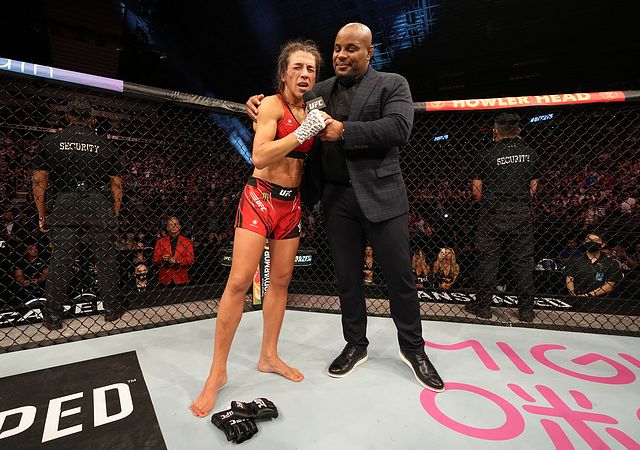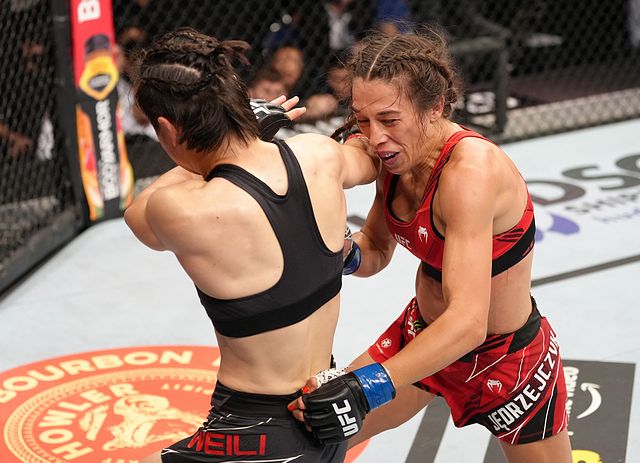Editor’s note: The views and opinions expressed below are those of the author and do not necessarily reflect the views of Sherdog.com, its affiliates and sponsors or its parent company, Evolve Media.
Joanna Jedrzejczyk on Thursday gestured for Rose Namajunas to approach her at the UFC 217 pre-fight press conference. “I will take your soul,” Jedrzejczyk declared from close range with a menacing glare. “You don’t know s--- about being a champion and you’re never going to be a champion. I give you no chance. For the first time you will face someone like me. Believe me, I’m taking your soul with me.” Point made, the undefeated champion stuck her fist right in the face of the overwhelming underdog challenger and strolled away with her typical fight-week swagger. Namajunas stood there stoically reciting the Lord’s Prayer, like a townsperson preparing for a marauding barbarian army about to arrive at the city gates.
Two days later at Madison Square Garden in New York, Namajunas was on top of Jedrzejczyk, raining down punches on the badly dazed champion until referee John McCarthy called off the fight. Jedrzejczyk appeared to tap to the strikes -- she has since denied that the gesture she made with her hand was the signal of submission -- but either way, she had clearly had enough from an opponent she so strenuously belittled. The conqueror was improbably defeated by an unexpected challenger.
This is not by any means intended to disparage Jedrzejczyk. Her trash talk makes her fights more interesting for fans and also serves as effective psychological warfare she can exploit to her advantage. Moreover, Jedrzejczyk has earned the right to firm self-confidence. She has backed it up throughout her career, and that strand of hyper confidence has fueled so many of our greatest athletes. It serves them well, and it serves their sports well, too. However, the shocking end of Jedrzejczyk’s title run was yet another reminder of how cruel a sport MMA is to its most successful and confident participants.
Jedrzejczyk can take solace that what she experienced is something all the best have gone through. Anderson Silva floated around with grace and finesse while dodging his opponents’ best shots for years. Then one night, he was confidently ducking his head in and out like he had so many times before when Chris Weidman connected with the perfect punch right to the jaw. Silva went out in what was a shocking, sudden and violent end to one of the sport’s great runs. To add insult to injury, some knocked Silva at his lowest moment for perceived arrogance and disrespect for Weidman, despite “The Spider” utilizing that style effectively for years.
After that fight, Silva surprised many by indicating he didn’t want a rematch. He perceptively observed it was now Weidman’s time, not his. At the time, it felt like a strange comment because Silva had dominated for so long that it was difficult to accept it could be over so quickly. Yet with hindsight, Silva was absolutely right. In MMA, success has often ended suddenly and unexpectedly.
Fedor Emelianenko likewise had to deal with a sudden fall that many linked to perceived overconfidence. Fabricio Werdum baited Emelianenko into his guard by going down from an early punch. Emelianenko went right into Werdum’s lair, and by the time he realized his mistake, it was too late. His nearly decade-long undefeated run was over and he would never again reach that status. Emelianenko dealt with the loss with his typical humility, but his critics seized on the opportunity to gloat that his “myth” was over.
It’s not an accident that Jedrzejczyk asked reporters not to bring up the Ronda Rousey comparison on Saturday, because that’s probably the biggest MMA fall of them all. Rousey was on top of the world when Holly Holm brought to her the crushing reality of the nature of MMA. She had to go through the same crushing and humbling fall that all MMA greats do, but she seemed to struggle with it the most. The more driven you are to be the best, the more difficult it is when you no longer are.
That’s not to say there aren’t positive lessons Jedrzejczyk can draw from the past. UFC 217 headliner Georges St. Pierre went through a very similar experience in 2007. After St. Pierre’s dominant title victory over Matt Hughes, many forecasted that St. Pierre would rule the welterweight division for years to come. His first defense came against heavy underdog Matt Serra. What transpired, of course, was perhaps the biggest upset in MMA history. Jedrzejczyk made it 3:03 before being stopped by strikes; St. Pierre lasted only 22 seconds longer. It was a shocking setback. St. Pierre didn’t despair. Rather, he refocused. He acknowledged partying too much and dedicated his full focus to being the best he could. He hasn’t lost since. Jedrzejczyk, too, has the opportunity to use her loss to Namajunas as a lesson and to come back more devastating than ever. Like Emelianenko noted after his loss to Werdum, the one who doesn’t fall never stands up.
Of course, just like Jedrzejczyk learned from St. Pierre, so too can St. Pierre learn from Jedrzejczyk. MMA’s an unforgiving endeavor. His triumph over Michael Bisping likely has him riding high, but in a division full of bigger, younger, quicker opponents, a cruel fall could be on the horizon if he isn’t careful.
Todd Martin has written about mixed martial arts since 2002 for a variety of outlets, including CBSSports.com, SI.com, ESPN.com, the Los Angeles Times, MMApayout.com, Fight Magazine and Fighting Spirit Magazine. He has appeared on a number of radio stations, including ESPN affiliates in New York and Washington, D.C., and HDNet’s “Inside MMA” television show. In addition to his work at Sherdog.com, he does a weekly podcast with Wade Keller at PWTorch.com and blogs regularly at LaTimes.com. Todd received his BA from Vassar College in 2003 and JD from UCLA School of Law in 2007 and is a licensed attorney. He has covered UFC, Pride, Bellator, Affliction, IFL, WFA, Strikeforce, WEC and K-1 live events. He believes deeply in the power of MMA to heal the world and bring happiness to all of its people.



